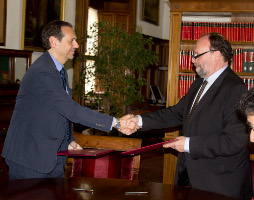BROSETA and the University of Granada present a chair about ‘Tax fraud and the prevention of money laundering’
 The rector of the University of Granada, Francisco González Lodeiro, and the partner of BROSETA, Isidro del Moral, have signed a collaboration agreement to promote the creation of a Chair on “Control of Tax fraud and the prevention of money laundering” between BROSETA and the University of Granada.
The rector of the University of Granada, Francisco González Lodeiro, and the partner of BROSETA, Isidro del Moral, have signed a collaboration agreement to promote the creation of a Chair on “Control of Tax fraud and the prevention of money laundering” between BROSETA and the University of Granada.
The project, pioneered in Andalusia, is co-funded and promoted by the Faculty of Work Sciences of the UGR, where it will be headquartered, and aspires to become the reference for academic analysis of tax fraud and money laundering “in order that enterprises, entities and associations representing the sector have the intellectual capabilities and research methodology necessary”. To do so, they will organise their activities into four large blocks: training programs, research, publications and dissemination.
As fruits of the collaboration between the University of Granada and BROSETA they have already organised several workshops on combating tax fraud and regulatory compliance on prevention of money laundering and financing of terrorism, an issue of particular relevance today. The latest took place in Madrid this April, and they involved some of the most prominent experts in the field in all of Spain.
With the signing of the Convention for the creation of the UGR-BROSETA Chair of “Control of Tax Fraud and Prevention of Money Laundering”, both institutions cement their cooperation in the academic field and leave open a path to the participation of other centres, departments and institutes of the University of Granada, which can incorporate into their research activities organised by the Chair sponsored by BROSETA.
TRAINING AND RESEARCH
The UGR-BROSETA Chair will be developed as an educational and research project aimed at professionals in the public and private sectors working in the fields of prevention and investigation of money-laundering and combating the financing of terrorism. In addition, it will also occupy University students who want to specialise as managers and analysts in subjects such as the prevention of money laundering and combating the financing of terrorism, both in the private sector (financial institutions, large corporations, other obligors), and in the public sector (armed forces and security of the State, prosecutors and the judiciary).